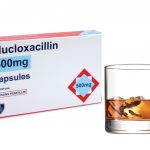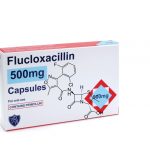Why is Flucloxacillin Not Used in USA?

What is flucloxacillin?
Flucloxacillin was developed in the 1960s following an increase in penicillin-resistant (beta-lactamase producing) staphylococcal infections due to the widespread use of benzylpenicillin by 1960.
Flucloxacillin belongs to a class of medicines called ‘antibiotics‘ used to treat various bacterial infections such as skin infections, soft tissue infections, respiratory tract infections, ear infections, bone infections, bone marrow infections, intestinal tract infections, urinary tract infections, meningitis, and septicemia. A bacterial infection is a condition in which harmful bacteria grow in the body and cause infection. It can infect any part of the body and multiply very quickly.
Flucloxacillin is commonly prescribed medication in the United Kingdom, Australia and New Zealand and it is available as:
- Capsules: 250 mg, 500 mg
- Liquid medicine (syrup or suspension): 125 mg, 250 mg or 500 mg in 5 mL; some may contain a small amount of sugar.
How it works
Flucloxacillin contains ‘Flucloxacillin’ that works by preventing the cell wall formation of the bacteria which is necessary for their survival. Thereby, Flucloxacillin kills the bacteria and effectively treats various bacterial infections.
Why is flucloxacillin not used in the USA?
Flucloxacillin is not available in the U.S. because it has not been approved for use by the United States Food and Drug Administration. Non-FDA approved uses include the treatment of staphylococcal infections including pneumonia, osteomyelitis, skin and soft tissue infections. It is acceptable to use flucloxacillin during breastfeeding and is frequently used abroad to treat mastitis in nursing mothers.
One of the major reasons cited for the rejection of flucloxacillin is its life-threatening side effects. The use of flucloxacillin is linked to a prolonged, severe and often debilitating cholestatic hepatitis which resulted in over 17 deaths in a single year. Patients over 55 years old and those taking the drug for more than 14 days have an increased risk.
In several countries, where this medication is available, it is restricted for severe staphylococcal infections when the benefits outweigh the risks.
From a historical angle, Beecham popularised flucloxacillin in the UK, while Bristol Laboratories concentrated on marketing oxacillin and dicloxacillin in the United States, leading to the difference in use in both countries. Flucloxacillin was first marketed in Europe in the 1970s.
Flucloxacillin Side Effects
Flucloxacillin can cause severe liver damage, which can make the skin and whites of the eyes turn yellow in colour. This is more likely to occur in older patients and those who take it for more than 14 days. Immediately contact your doctor if you notice any yellowing of your eyes or skin.
Tell your doctor or pharmacist as soon as possible if you do not feel well while you are using Flucloxacillin.
Flucloxacillin treats infections in most people however; it may cause side effects in some people. All medicines can have side effects. Sometimes they are serious, most of the time they are not. You may need medical treatment if you get some of the adverse effects. Ask your doctor or pharmacist to answer any questions you may have.
Very rare side effects (may affect up to 1 in 10,000 people): Very rare cases of blood and fluid abnormality (high anion gap metabolic acidosis) which occurs when there is an increase in plasma acidity when flucloxacillin is used concomitantly with paracetamol, generally in the presence of risk factors (see Before you take Flucloxacillin) Tell your doctor if you notice any of the following and they worry you:
• feeling sick or vomiting;
• stomach upset, diarrhoea;
• oral thrush (white, furry sore tongue and mouth);
• vaginal thrush (sore and itchy vagina, vaginal discharge).
These are the more common side effects of Flucloxacillin. Mostly these are mild and short-lived.
Tell your doctor immediately or go to Accident and Emergency at the nearest hospital if you notice any of the following:
• watery and severe diarrhoea, which may also be bloody;
• severe stomach cramps;
• tiredness, headaches, being short of breath when exercising, dizziness and looking pale;
• bleeding or bruising more easily than normal;
• frequent infections such as fever, chills, sore throat or mouth ulcers;
• yellowing of the eyes or skin (jaundice);
• painful, swollen joints;
• aching muscles, muscle tenderness or weakness, not caused by exercise;
• dark or cloudy urine, blood in the urine.
These may be serious side effects of Flucloxacillin. You may need urgent medical attention.
These serious side effects are very rare. If any of the following happen, stop taking Flucloxacillin and tell your doctor immediately, or go to Accident and Emergency at the nearest hospital:
• skin rash, itching or hives;
• swelling of the face, lips, tongue or other parts of the body;
• shortness of breath, wheezing or troubled breathing. If you experience any of these side effects, you may have had a serious allergic reaction to Flucloxacillin. You may need urgent medical attention or hospitalisation. These side effects are very rare.
Tell your doctor immediately if you notice any of the following, even if they occur several weeks after stopping treatment with Flucloxacillin:
• watery and severe diarrhoea, which may also be bloody;
• severe stomach cramps;
• yellowing of the eyes or skin (jaundice).
Other adverse effects not listed above may also occur in some patients. Tell your doctor if you notice any other effects. Do not be alarmed by this list of possible adverse effects. You may not experience any of them.
What medications can interact with flucloxacillin?
Several medications may interact with flucloxacillin they include:
- Clavulanate
- Bedaquiline
- Acenocoumarol
- Asparaginase
- Atorvastatin
- Bedaquiline
- Alectinib
- Carbamazepine
Does alcohol affect how well flucloxacillin will work?
Usually, alcohol does not affect how well flucloxacillin works to fight an infection, but the combination may lead to unpleasant side effects. However, in some circumstances levels of a drug in your bloodstream might be changed which could alter effectiveness.





